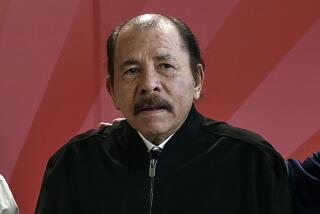U.S. Panel Cites Rise in Religious Persecution by China
- Share via
WASHINGTON — The Chinese government intensified religious persecution after Congress awarded it permanent normal trade status last year, apparently because Beijing concluded that the United States is not serious about advocating tolerance, a high-level U.S. commission said Monday.
“There has been a significant deterioration in religious freedom since [normal trade status] was voted,” said Elliott Abrams, chairman of the U.S. Commission on International Religious Freedom. “China has concluded that trade trumps all.”
The religiously diverse and bipartisan panel urged the Bush administration and Congress to link China’s treatment of believers to all aspects of U.S.-China relations, especially by using Washington’s diplomatic leverage to block China’s application to host the 2008 Olympic Games.
In its annual report to the White House and Congress, the commission examined 10 countries, ranging from those such as India and Indonesia, which promise tolerance but fail to stop violence between religious groups, to others such as China and Sudan that engage in often brutal suppression.
China differentiates between officially sanctioned religious groups, which are supposed to operate under tight government control, and unregistered groups, which are outlawed. Last year, the commission said, conditions for both worsened.
The report said the torture of believers increased, the government confiscated and destroyed as many as 3,000 unregistered religious buildings, and China continued to interfere in the selection of religious leaders. The crackdown extended to Christians, followers of Falun Gong, Uighur Muslims and Tibetan Buddhists.
The commission called for regulations to require corporations seeking to sell securities in U.S. financial markets to disclose business links to countries that are on a State Department list of nations that the U.S. believes egregiously violate religious liberty.
It also called for an outright ban on participation in U.S. securities exchanges by any corporation engaged in oil and gas development in Sudan, which Abrams called “the world’s most violent abuser of religious freedom.”
The panel said the Sudanese government, dominated by Arab Muslims from the north of the country, uses oil revenue to finance brutal repression of southerners, who are mostly black Christians and followers of traditional African religions. The report said the government condones a slave trade that preys on southerners, bombs humanitarian targets and withholds food as a means of religious intimidation.
Abrams said oil companies doing business in Sudan include Talisman Energy of Canada, TotalFina of France, Lundin Oil of Sweden, PetroChina of China and Petronas of Malaysia.
In response to criticism from human rights groups, Talisman recently released an independent report acknowledging that its airstrips were used on at least four occasions by the Sudan air force to mount bombing raids. The corporation pledged to conduct human rights awareness training for some key personnel and to advocate the payment of compensation to populations damaged by oil operations.
The commission was established under a 1998 law. Its members are appointed by the president and the Republican and Democratic leaders of the Senate and House.
The law also requires the State Department to draft its own list of violators. In addition to Sudan, the department’s list includes Myanmar, China, Iran, Iraq and the Taliban regime in Afghanistan.
Abrams’ commission urged that companies doing business with countries on the State Department list be banned from raising money in U.S. capital markets.
Using somewhat different criteria, the commission identified as violators China, India, Indonesia, Iran, North Korea, Nigeria, Pakistan, Russia, Sudan and Vietnam.
The commission charged that the governments of China, Sudan, Iran, North Korea and Vietnam overtly repress religious groups. The others were accused of failing to stop persecution of one religious group by another.
More to Read
Sign up for Essential California
The most important California stories and recommendations in your inbox every morning.
You may occasionally receive promotional content from the Los Angeles Times.









